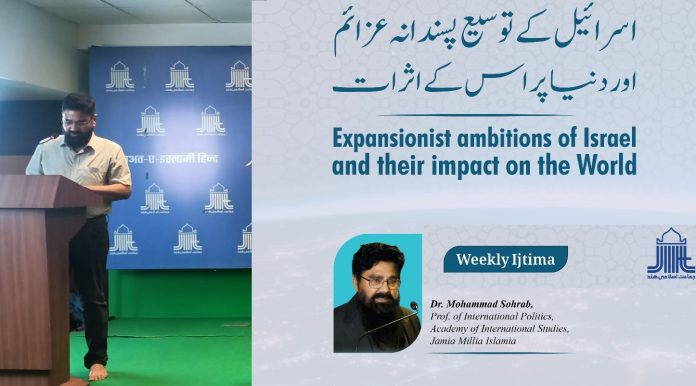New Delhi: A public meeting at Jamaat-e-Islami Hind headquarters heard a strong critique of Israel’s expansionist project from Dr. Mohammad Sohrab, Professor of International Politics at Jamia Millia Islamia. Speaking on the theme “Expansionist Ambitions of Israel and Their Impact on the World,” Dr. Sohrab argued that Israel’s foundation rests on myths rather than history or religion.
He said Israel’s vision of “Greater Israel” is derived from a distorted narrative of the kingdoms of Prophet Dawood and Prophet Sulaiman. These kingdoms, he explained, were never exclusively Jewish but part of a shared religious heritage in Judaism, Christianity, and Islam. Yet Israel has redrawn history to portray them as solely Jewish and has mapped this reconstruction onto a modern political agenda.
Dr. Sohrab highlighted that the mythical boundaries of “Greater Israel” extend far beyond present-day borders, covering parts of Arabia, Cyprus, and Turkey. This imaginary geography, he warned, continues to inspire political and military expansion in the Middle East.
Tracing the origins of this project, he said the idea of a “Judeo-Christian civilisation” was crafted in Europe during the 15th and 16th centuries to overcome deep theological divides. Protestant groups later became active promoters of the Greater Israel concept, presenting it as a religious and moral duty.
He identified four key myths sustaining the Israeli project: Jews as God’s chosen people, Jews as a people without land, Palestine as a land without people, and Palestine as the promised land. These myths, he stressed, were political inventions. Historical records confirm Palestine was inhabited, but such evidence was dismissed to maintain the narrative.
The Balfour Declaration of 1917 and Britain’s support gave legitimacy to Zionist ambitions, he said. Israel’s declaration in 1948 was a political decision, not a theological necessity. He also criticised Arab regimes for policies that strengthened Israel, including concessions and land deals.
Dr. Sohrab urged Muslims, especially in India, to study these myths and respond intellectually. Without confronting them, he warned, the project of Greater Israel will continue unchecked.




